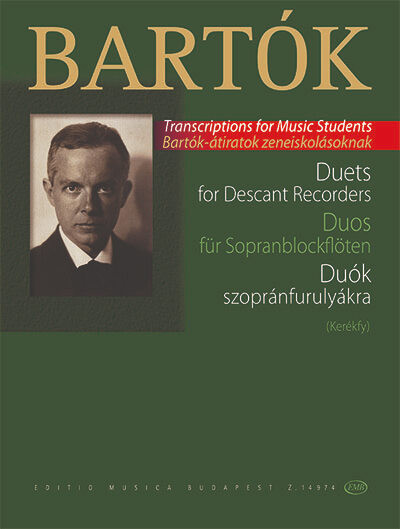Description
Bartók Béla: Duets for Descant Recorders – A Harmonious Choral Work for Children and Female Choruses (Music Score)
Product Information
- Product Type: Paperback Music Score
- Title: Bartók Béla: Duets for Descant Recorders (from the Children's and Female Choruses)
- Author: Kerékfy Márton
- Publisher: Editio Musica Budapest Zeneműkiadó
- Publication Year: 2016
- Publication Place: Budapest, Hungary
- ISBN: 9790080149744 / 979-0080149744
- Pages: 16 pages
- Dimensions: 23 cm x 30.2 cm
- Language(s): Hungarian, English, German
Overview
"Bartók Béla: Duets for Descant Recorders" is a refined collection of nine two-part choral pieces, transcribed idiomatically for descant and treble recorders. This score captures the vibrant spirit of Bartók’s creative peak in the summer of 1935, when he was busy crafting masterpieces such as his String Quartet No. 5 and Music for Strings, Percussion and Celesta. Although derived from folk texts, the music is unmistakably Bartók’s own, exhibiting motifs, rhythmic formulas, and line structures reminiscent of Hungarian folk songs.
Hungarian Translation – Overview (Áttekintés)
A "Bartók Béla: Duets for Descant Recorders" egy kifinomult gyűjtemény kilenc kétnyelvű kórusdalt, amelyeket idiomatikusan adtak át descant és szólamfuvolákra. Ez a kotta visszaadja Bartók 1935 nyarának élénk alkotói szellemét, amikor olyan mesterművek, mint az Ötödik vonósnégyes és a Vonósok, Ütőhangszerek és Celesta előadásai születtek. Bár a darabok népi szövegeken alapulnak, a zene egyértelműen Bartók saját alkotása, mely magyar népdalokra emlékeztető motívumokat, ritmikai formulákat és vonalstruktúrákat vonultat fel.
Product Features
- Format: Paperback score
- Page Count: 16 pages
- Dimensions: 23 cm x 30.2 cm
- Languages: Hungarian, English, German
- Edition Details: Contains nine two-part pieces tailored for descant and treble recorders, preserving the authentic spirit of Bartók’s folk-inspired choral works.
Interesting Facts
- Historical Context: Composed during the summer of 1935, these pieces were created at the zenith of Bartók’s career—alongside other masterpieces such as his String Quartet No. 5 and Music for Strings, Percussion and Celesta.
- Unique Blend: The work features folk texts that have been polished and stylized, yet the music remains wholly original to Bartók, incorporating rhythmic and melodic elements that vividly recall Hungarian folk traditions.
- Transcription Quality: Both editions faithfully capture the idiomatic character of the original works, providing performers with an accessible yet authentic interpretation for descant and treble recorders.
Hungarian Translation – Interesting Facts (Érdekes Tények)
- Történelmi Kontextus: A darabok 1935 nyarán születtek, Bartók pályájának csúcspontján, amikor olyan mesterművek mellett dolgozott, mint az Ötödik vonósnégyes és a Vonósok, Ütőhangszerek és Celesta.
- Egyedi Ötvözet: A művek népi szövegeken alapulnak, amelyeket igényesen formáltak és stilizáltak, mégis a zene maradéktalanul Bartók eredeti alkotása, mely ritmikai és dallami elemekkel idézi fel a magyar népzenei hagyományokat.
- Átírás Minősége: Mindkét kiadás hűen visszaadja az eredeti művek idiomatikus jellegét, lehetővé téve a fuvolás előadók számára az autentikus értelmezést mind a descant, mind a szólamfuvolák esetében.
Track Listing
- To my homeland
- Candle song
- Don't leave me!
- The fickle girl
- Song of Ioneliness
- Beadbaking
- Hussar
- Had I never seen you
- Canon
Publishers
Published by Editio Musica Budapest Zeneműkiadó in Budapest, 2016. Proudly made in Hungary, this edition upholds the rich cultural and musical heritage of Béla Bartók's work.
We value your feedback! Share your experience with this product to help others make informed decisions. Your review is important to us!
Hashtags
English:
#BartókBéla #DuetsForRecorders #DescantRecorders #ChoralDuets #EditioMusicaBudapest #ClassicalFolkMusic #ChoralScore #1935Composition #PaperbackMusic
Hungarian (Címkék):
#BartókBéla #Duettok #DescantFuvola #Zeneműkiadó #Kották #MagyarZene #1935Kompozíció #GyermekKórus #NőiKórus
















